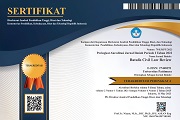Efektivitas Sighat Taklik Talak Dalam Perkawinan Islam Di Indonesia
 ), Ahmaturrahman Ahmaturrahman(2), Sri Turatmiyah(3)
), Ahmaturrahman Ahmaturrahman(2), Sri Turatmiyah(3)
(1) Fakultas Hukum Universitas Sriwijaya, Indralaya, Indonesia
(2) Fakultas Hukum Universitas Sriwijaya, Indralaya, Indonesia
(3) Fakultas Hukum Universitas Sriwijaya, Indralaya, Indonesia
 Corresponding Author
Corresponding Author
Abstract
Keywords
DOI
10.47268/ballrev.v3i1.1019
Published
2022-06-15
How To Cite
@article{BALLREV1019,
author = {K Hasan and Ahmaturrahman Ahmaturrahman and Sri Turatmiyah},
title = {Efektivitas Sighat Taklik Talak Dalam Perkawinan Islam Di Indonesia},
journal = {Batulis Civil Law Review},
volume = {3},
number = {1},
year = {2022},
keywords = {Effectiveness; Sighat Taklik Talak; Religious Courts},
abstract = {The effectiveness of the Sighat Taklik Talak in Islamic marriage law in Indonesia, until now from the aspect of the implementation of this Sighat Taklik Talak pronunciation, after the Ijab Kabul is held in the marriage walimah, is always spoken by the husband who is heard by all the marriage aqdun assemblies. It was even signed by the bride and groom and the witnesses, so this Sighat Taklik Talak has legal consequences. However, in the implementation of taklik talak as the causes of divorce, it can be said that it is rarely used or even none at all who applies for divorce through the path or means of violating sighat taklik talak, and because there is no request from one of the parties to divorce, then the judge cannot use sighat taklik talak as the reason for the divorce because the judge is passive.},
issn = {2746-8151}, pages = {113--125} doi = {10.47268/ballrev.v3i1.1019},
url = {https://fhukum.unpatti.ac.id/jurnal/ballrev/article/view/1019}
}
| Amiruddin, & Askin, Z. (2010). Pengantar Metode Penelitian Hukum. Raja Grafindo Persada. | ||||
| Dahwal, S. (2017). Perbandingan Hukum Perkawinan. Mandar Maju. | ||||
| Labetubun, M. A. H., & Fataruba, S. (2020). Implikasi Hukum Putusan Pengadilan terhadap Pembatalan Perkawinan. Batulis Civil Law Review, 1(1), 54-59. https://doi.org/10.47268/ballrev.v1i1.430 https://doi.org/10.47268/ballrev.v1i1.430 | ||||
| Rofiq, A. (2019). Hukum Pedata Islam di Indonesia. Raja Grafindo Persada. | ||||
| Syarifuddin, A. (2014). Hukum Perkawinan Islam di Indonesia (Antara Fiqh Munakahat dan Undang-Undang Perkawinan. Kencana Prenada Media Group. | ||||
| Dublin Core | PKP Metadata Items | Metadata for this Document | |
| 1. | Title | Title of document | Efektivitas Sighat Taklik Talak Dalam Perkawinan Islam Di Indonesia |
| 2. | Creator | Author's name, affiliation, country | K N Sofyan Hasan; Fakultas Hukum Universitas Sriwijaya, Indralaya; Indonesia |
| 2. | Creator | Author's name, affiliation, country | Ahmaturrahman Ahmaturrahman; Fakultas Hukum Universitas Sriwijaya, Indralaya; Indonesia |
| 2. | Creator | Author's name, affiliation, country | Sri Turatmiyah; Fakultas Hukum Universitas Sriwijaya, Indralaya; Indonesia |
| 3. | Subject | Discipline(s) | |
| 3. | Subject | Keyword(s) | Effectiveness; Sighat Taklik Talak; Religious Courts |
| 4. | Description | Abstract | The effectiveness of the Sighat Taklik Talak in Islamic marriage law in Indonesia, until now from the aspect of the implementation of this Sighat Taklik Talak pronunciation, after the Ijab Kabul is held in the marriage walimah, is always spoken by the husband who is heard by all the marriage aqdun assemblies. It was even signed by the bride and groom and the witnesses, so this Sighat Taklik Talak has legal consequences. However, in the implementation of taklik talak as the causes of divorce, it can be said that it is rarely used or even none at all who applies for divorce through the path or means of violating sighat taklik talak, and because there is no request from one of the parties to divorce, then the judge cannot use sighat taklik talak as the reason for the divorce because the judge is passive. |
| 5. | Publisher | Organizing agency, location | Faculty of Law, Universitas Pattimura |
| 6. | Contributor | Sponsor(s) | |
| 7. | Date | (YYYY-MM-DD) | 2022-06-15 |
| 8. | Type | Status & genre | Peer-reviewed Article |
| 8. | Type | Type | |
| 9. | Format | File format | |
| 10. | Identifier | Uniform Resource Identifier | https://fhukum.unpatti.ac.id/jurnal/ballrev/article/view/1019 |
| 10. | Identifier | Digital Object Identifier | 10.47268/ballrev.v3i1.1019 |
| 11. | Source | Title; vol., no. (year) | Batulis Civil Law Review; Vol 3, No 1 (2022): VOLUME 3 NOMOR 1, MEI 2022 |
| 12. | Language | English=en | en |
| 13. | Relation | Supp. Files | |
| 14. | Coverage | Geo-spatial location, chronological period, research sample (gender, age, etc.) | |
| 15. | Rights | Copyright and permissions | Copyright: Authors who publish their manuscripts in this Journal agree to the following conditions: 1. The copyright in each article belongs to the author, as well as the right to patent. 2. Authors are able to enter into separate, additional contractual arrangements for the non-exclusive distribution of the journal's published version of the work (e.g., post it to an institutional repository or publish it in a book), with an acknowledgment of its initial publication in this journal. 3. Authors are permitted and encouraged to post their work online (e.g., in institutional repositories or on their website) prior to and during the submission process, as it can lead to productive exchanges, as well as earlier and greater citation of published work. 4. Authors have the right to self-archiving of the article (Author Self-Archiving Policy)
Licence : Batulis Civil Law Review Journal is disseminated based on the Creative Commons Attribution-NonCommercial 4.0 International license terms. This license allows anyone to copy and redistribute this material in any form or format, compose, modify, and make derivatives of this material for any purpose. You cannot use this material for commercial purposes. You must specify an appropriate name, include a link to the license, and certify that any changes have been made. You can do this in a way that is appropriate, but does not imply that the licensor supports you or your use.
|
Copyright (c) 2022 K N Sofyan Hasan, Ahmaturrahman Ahmaturrahman, Sri Turatmiyah

This work is licensed under a Creative Commons Attribution-NonCommercial 4.0 International License.

 : 3698 times
: 3698 times Download : 2622 times
Download : 2622 times














